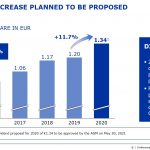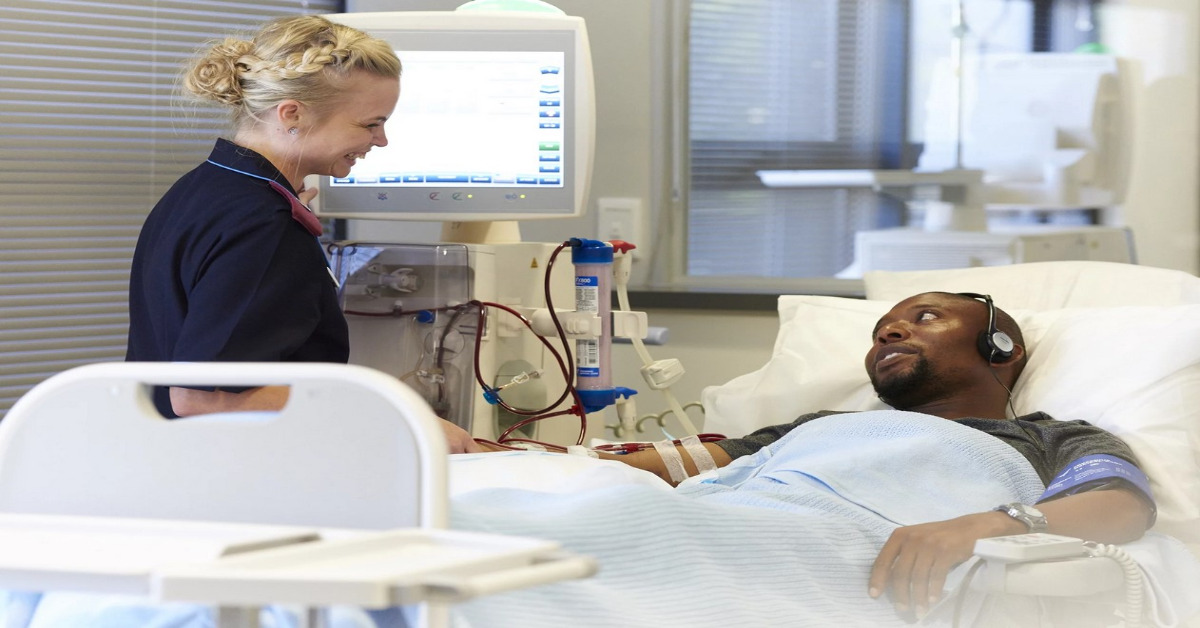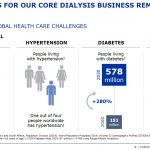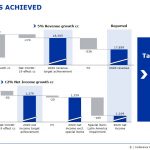Contents
Fresenius Medical Care: A Slightly Undervalued Global Leader is a Guest Post provided by Value of Stocks, an independent financial information provider focused on analyzing stocks with a value investing approach. Its main goal is to help investors make better investment decisions.
Global Leader Overview
In this article, I provide my reasons for why I view Fresenius Medical Care as a Slightly Undervalued Global Leader.
Fresenius Medical Care AG & Co. (NYSE: FMS) is a medical company based in Germany with a strong global presence and more specifically in North America. It was founded in 1996 after Fresenius SE (OTC: FSNUY), the parent company, was given control of the new entity after it merged its dialysis business with National Medical Care which was a subsidiary of W.R. Grace (NYSE: GRA) and the largest dialysis clinic operator worldwide at the time.
FMS focuses on dialysis and hemodialysis treatments and equipment. It has an advantage over the competition in that it offers treatment and dialysis equipment.
It is the largest kidney dialysis company based on reported revenues and the number of patients. In FY2020, it treated 346,553 patients (~0% growth in FY2020) in 4,092 dialysis clinics (2% growth in FY2020) worldwide.
A good company overview is found in the Our Vision Becomes Reality 2020 Magazine.
Dialysis Market
The global dialysis market is projected to reach $177.56B by 2027 in that Hypertension and Diabetes are two of the most common medical conditions that lead to chronic kidney disease which force patients to have dialysis treatments. Unfortunately, the number of people worldwide who suffer from these conditions continues to increase. An estimated 1.3B people worldwide, roughly 16.6% of the global population, suffer from hypertension while 463M, or 5.9%, suffer from diabetes. The prevalence of these conditions among the global population ensures the global dialysis market will continue to expand.
Source: Fresenius Q4 2020 Analyst Presentation
Some people are unaware they suffer from these conditions and receive no diagnosis. Not everyone, however, who suffers from hypertension and diabetes will ultimately require dialysis treatments.
A combination of a growing and aging population and increased availability of dialysis treatments explain why FMS has grown. This study explains the future of dialysis.
A study published in 2020, shows that although COVID-19 does not target the kidneys, acute kidney injury can affect 4 - 23% of COVID-19 patients. Numerous programs implemented to help deal with the COVID-19 pandemic have benefited the company in the short-term.
FMS has a strong competitive position with an estimated ~10% global market share. In the US, it has a 35% market share while Davita (NYSE: DVA), its major competitor, has a 37% market share.
Shift Toward Home Treatment
The kidney care executive order, signed by Trump in July 2019, brought some changes to the overall dialysis market landscape. It aimed to reduce the number of Americans with late-stage renal disease by increasing preventive care and included incentives to boost home dialysis treatment.
The main objective of reducing the use of dialysis centers could negatively impact FMS. Management, however, foresaw this and in early 2019, FMS acquired NxStage. NxStage's main product is portable dialysis equipment for at-home treatment. The deal, valued at $1.976B, solidified FMS's competitive position.
Management estimates that ~15% of all the treatments will be in-home dialysis by 2022 versus ~ 14% in 2020 in the US market. This could considerably reduce expenses and fixed costs and should allow FMS to considerably expand its margins. FMS, however, will face fierce competition from CVS Health (NYSE: CVS).
COVID-19 has accelerated the transition of dialysis treatment to the patient’s home. In this high barriers to entry market, it is crucial FMS remain a market leader in home treatments. Reaping the rewards of lower CAPEX and higher margins should help the company pay down some of its long-term debt.
Historical Performance
FMS has increased its patient base by over 400% over the last 2 decades and it has expanded its number of clinics by 340%. In 2019 it recorded 52M treatments compared to 9.1M in 1997. Currently, it treats over 345,000 patients worldwide. While FMS's strong historical operational performance is not indicative of the future it is, however, a positive.
Over 69% of the company's revenue is derived from North America, 15.4% from EMEA, and 10.6% from the Asia-Pacific region. Latin America only accounts for 4.1% of its revenue distribution. The Asia-Pacific and North American segments accounted for most of the growth in FY2020.
Health care products account for ~20% of revenue while ~80% is treatment revenue.
Over the last decade, FMS has increased revenue at a 6.78% CAGR and net income at a 5% CAGR. Free cash flow has grown at an 8.5% CAGR and has been stable at ~7.1% of revenue during this timeframe. Management is also projecting revenue CAGR to remain around mid-single-digit and net income around the high single-digits until 2025.
FY2020 Results
On February 23, 2021, FMS released Q4 and FY2020 results, FY2021 guidance, and confirmed its 2025 outlook.
 Source: Fresenius Q4 2020 Analyst Presentation
Source: Fresenius Q4 2020 Analyst Presentation
FMS has committed to invest €500M to reduce costs and improve margins.
Revenue grew ~2% from FY2019 with a 3% increase in treatments being a contributor to this revenue growth.
Net income decreased 3% to €1,164M due to the increase in the cost of sales due to COVID-19, and integration costs related to the NxStage acquisition. Also, increased mortality due to COVID-19 in FMS’s patient base and higher labour costs contributed to the weaker performance.
A €195M Goodwill impairment charge was recorded on its Latin America segment due to increased risk.
In Q4, the health care services segment reported a 6% YoY decline in revenue because of the COVID-19 impact. On the other hand, the health care products segment grew 2% YoY. It should be noted that the non-dialysis products actually grew 30% compared with Q4 2019, despite only amounting to €26M.
Q4 operating cash flow was €584M versus €771M in Q4 2019.
Free cash flow in Q4 2020 decreased to €283M from €434M in Q4 2019 or ~35% YoY.
FMS holds €1.081B in cash and cash equivalents which is sufficient for its short-term requirements.
Total debt and lease liabilities decreased 10% to €12.830B compared with 2019.
Net debt stands at ~€11.298B and the leverage ratio decreased to 2.9x debt-to-EBITDA.
COVID-19 has negatively impacted operations and this is expected to persist in 2021. Management expects revenue to grow in the low to mid-single digits in FY2021 but net income is expected to decline 25% to €873M in a worst-case scenario.
Dividends
The current €1.2 dividend per share yields 1.95% and the dividend payout ratio is a conservative sub-30%.
FMS has a history of 23 consecutive years of dividend increases. A proposal is to be presented to increase the dividend by 11.7% to €1.34 at FMS's Annual General Meeting in May 2021. This would mark the 24th consecutive annual dividend increase.
 Source: Fresenius Q4 2020 Analyst Presentation
Source: Fresenius Q4 2020 Analyst Presentation
Two Fresenius Medical Care American Deposit Receipts correspond to one ordinary share of Fresenius Medical Care.
Shares count in FY2017 was 615 million shares versus 589 million in FY2020. A total of 10.8M shares were purchased in the recent buy-back program that ended in April 2020. The outstanding share count was reduced by 3.5% and the total cost was €685M for an average price of €63.43. This is below the current share price.
It is debatable whether management should conduct a buy-back program instead of reducing debt. We see in this list of Bonds & Convertible Bonds that debt that matures in 2022 - 2024 has high coupon rates. I can understand why management chose to allocate capital toward the buy-back but it would still be wise to use some of the capital to redeem these higher interest rate bonds to reduce expenses.
Credit Ratings
FMS's rating schedule reflects comparable long-term unsecured credit ratings from Moody's and Fitch. The S&P rating is one notch higher.
All three ratings are investment grade and define as an obligor having ADEQUATE capacity to meet its financial commitments. Adverse economic conditions or changing circumstances, however, are more likely to lead to a weakened capacity of the obligor to meet its financial commitments.
These ratings are in stark contrast to those assigned to DVA by Moody's and S&P Global. Moody's has assigned a long-term unsecured credit rating of Ba2 since April 2017 (stable outlook) and S&P Global has assigned a BB rating since June 2014 (negative outlook). Both ratings are identical and are the middle tier of the 'Non-investment grade speculative' category. These ratings define an obligor as being LESS VULNERABLE in the near term than other lower-rated obligors. It, however, faces major ongoing uncertainties and exposure to adverse business, financial, or economic conditions which could lead to the obligor's inadequate capacity to meet its financial commitments.
Undervalued Valuation
FMS's current market cap of €16.75B translates into a price-to-sales ratio of 0.94.
Its current enterprise value of ~€29B is greater than its market cap and shares trade at ~1.5x book value.
FY2020 Adjusted EBITDA was €4.140B. Based on FMS's current market cap, it trades at ~4x EBITDA.
The worst-case FY2021 net income scenario is ~ €873M thus giving FMS a P/E of ~19. Adjusted EBITDA for 2020 was €4.140B and using the current market cap it trades at ~4x EBITDA.
I view Fresenius Medical Care as a slightly undervalued global leader in comparison to DVA, its main competitor. DVA's shares have performed better but it trades at higher multiples. The risk associated with an investment in DVA is also greater as borne out by the difference in each company's credit ratings.
At this point, the stock price could further decline to more attractive prices. It will be important to monitor the results in 2021 since FMS margins will be crucial to determine its valuation. My entry point will be around €45, giving enough margin of safety, and a PE of ~15. Although it is unclear if it will reach that price, a possible market correction could provide a much lower entry point. At this point paying 20x earnings on a company whose net income will decrease by 16-25% does not seem like the best investment option, without a clear vision of what will happen in 2022. The biggest factors that could lead to a decline in net income are the mortality rate among FMS patients and the success of the COVID19 vaccination process.
Risks
Reputational Risk
There are reasons why FMS's share price is roughly similar to ~10 years ago.
The credibility and reputation of Fresenius SE (OTC: FSNUY), the parent company and its subsidiaries, are questionable.
In 2019, FMS agreed to pay more than $231M to the US Department of Justice and US Securities and Exchange Commission to resolve investigations for violating the Foreign Corrupt Practices Act. FMS bribed doctors and public health officials in multiple countries across Africa, Middle East and Europe. Some even allege the company bribed patients. The misconduct transpired during the 2007 - 2016 timeframe. FMS still faces further prosecution charges in Germany.
Fresenius Kabi, one of Fresenius SE's wholly-owned subsidiaries, recently settled a US Department of Justice investigation for $50 million and admitted it hid records from the FDA inspectors.
The damage to FMS's reputation from its recent legal issues is unknown. This poses a great deal of risk and explains why its shares trade at much lower multiples than its competitors.
Reliance on US Market
FMS derives ~69% of its annual revenue from the US market and over 30% from US health insurance reimbursement. Potential policy and legislative changes could impact the financial results. The Biden-Harris administration is prioritizing kidney health but uncertainty remains as to whether there will be any impactful changes.
Other Risks
The mortality rate among FMS patients could impact FY2021 financial results. The success of the COVID19 vaccine rollout will have a bearing on FMS's operations.
Final Take
FMS is one of the two industry leaders, it has an international presence and significant market share, and shares trade at a valuation that is lower than that of its major competitor. It also offers dialysis equipment and treatment thus allowing it to capture more revenue from each patient and to control the value-chain and derive economies of scale.
It has consistently grown its customer base and although it is not in a high-growth sector, revenue, earnings, and the dividend have grown consistently.
FY2021 will be challenging but growth possibilities exist in South America and Asia-Pacific regions. Furthermore, the shift to home care provides an opportunity for growth and cost reduction.
A concern, however, is the company's legal issues. The current low valuation might be an opportunity to acquire shares while they are under pressure but much will depend whether
- The company complies with laws and regulations going forward.
- The misconduct is ingrained in the organization and dishonest conduct persists.
The other concern is the probability of a ~25% decline in net income in FY2021 relative to FY2020.
Fresenius Medical Care is a slightly undervalued global leader but I would look to initiate a position around €45; a potential market correction could provide a much more attractive entry point.
Author bio: This is a guest post provided by Value of Stocks which is an independent financial information provider focused on analyzing stocks with a value investing approach. Its main goal is to help investors make better investment decisions.
Disclaimer and Disclosure: The guest author does not know your individual circumstances and is not providing individualized advice or recommendations. You should make investment decisions after conducting your own research and due diligence. The guest writer does not receive compensation for this article and has no position in any of the stocks mentioned.




